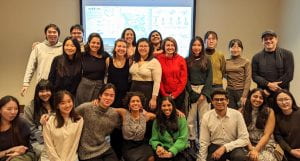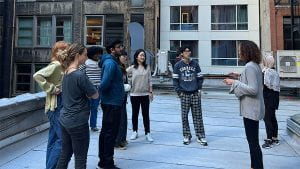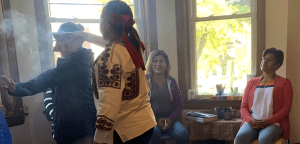Ithaca: The City Almost Everyone Can’t Wait to Leave
 By Stella Frank, URS ’25
By Stella Frank, URS ’25

I wanted to leave, as a kid, I told myself I would move across the country for college or at the first chance I got. When it came time for me to pick colleges I did leave, but I came back. I realized that I had unfinished business in the city of Ithaca and that my hometown truly was the best place for me to study the city form. Parts of me still want to leave—the same parts that did as a kid. I still live downtown in an apartment, very similar to one I grew up in with my father, where the landlords don’t care that the plumbing breaks every few weeks, there is a mouse infestation, and barely operable heat. When you ask them to fix it with urgency in your eyes you’re almost laughed off, they know that Ithaca is the second most expensive small city in the country in terms of rental housing and that I am considered lucky to find a place only a couple hundred dollars over a fair market rate.
Despite all of this, people pass through Ithaca to be lifted up. Some do this through educational institutions but Ithaca is also known as a sanctuary city for immigrants like my mom. While parts of its oasis-like reputation definitely pleased her, even she can’t wait to get out of Ithaca and makes it a priority to travel as much as possible. My mom was able to find good housing in a historically black neighborhood in Ithaca, Southside. Having two single parents and two homes in two different neighborhoods in Ithaca really opened my eyes to how racist cities and infrastructure can be. Beyond social perception are zoning and traffic choices. Two one-way streets with no red lights ran across the perimeter of the neighborhood, which made the usually pedestrian-friendly downtown area a hostile environment for walking. Roads would go on for a couple of blocks to have a seemingly random concrete slab turn them into a dead end. It always confused me why they would block off access to some of the most important roads, and give roads coming from other directions so much priority over ours.

The other is a doctor in economics from Cornell and an economic advisor for the Kenyan government, Ben Okumu, who had accumulated hospital debt after a car crash and the subsequent death of his wife. He had to seek medical treatment in Africa and fell behind on some mortgage payments. The eviction notice was served to his children while he was out of the country seeking treatment for blood clots. I was lucky enough to hear of his story and get him in contact with people at Cornell who could represent him legally.
In all of these ways and more, I see Ithaca tare people down and also bring them up, I just wish the luck that Ithaca brings to the wealthy as a city could be distributed ethically and equitably.
Cornell Team Wins Honorable Mention at ULI Hines Urban Design Competition

A Cornell team comprised of students from three different graduate programs received an Honorable Mention at the 2023 ULI Hines Urban Design Competition last month. With guidance from their advisor, CRP Lecturer Mitch Glass, team members Shunyi Hu (MRP ’24), Qianchen Yu (MRP ’24), Katie Zheng (MRP ’24), Yani Zhang (MLA ’24), and Jie Dong (MSAAD ’24) competed against over 420 students from 39 universities spanning across the United States, Canada, and India.
ULI – the Urban Land Institute – is an independent, non-profit, research and education organization based in Washington, DC. Originally incorporated in 1936, it’s now the largest network of cross-disciplinary real estate and land use experts in the world. The yearly competition offers graduate students the opportunity to form their own multidisciplinary teams and engage in a challenging exercise in responsible land use. Teams of five students pursuing degrees in at least three different disciplines have two weeks to devise a development program for a real, large-scale site. Teams provide graphic boards and narratives of their proposals including designs and market-feasible financial data.
This year, the project site was located in North Charleston, South Carolina at the confluence of the Cooper River and Noisette Creek in the vicinity of the Charleston Navy Yard Historic District. The site shares proximity with diverse and culturally significant neighborhoods, including Charleston Heights and Park Circle, the first “garden city” development in the southeastern US. Although the naval base uses are now gone, economic development has been strong in the area through the addition of manufacturing, service, and other employment centers. This has led to development pressures to build more housing, commercial, and hospitality uses while maintaining affordability and a sensitive approach to community and environmental issues. Located in the floodplain, students were challenged to envision the site as a water-receiving landscape with reasonably scaled development that would be compatible with future climate impacts.
Cornell’s submission, the STAGE project, is a contemporary and affordable mixed-use community in North Charleston. As site has enormous potential for mixed-use development but is located in a segregated community with extreme flood risk vulnerability, Cornell’s proposal aimed to build the site as a ‘STAGE’ to exhibit local culture, stimulate the economy, and enhance the site’s flood resilience. The STAGE is designed based on four pillars: equity, economic vitality, resilience, and connectivity. The students utilized existing configurations and form, following a horizontal configuration at the waterfront to allow access from the main roadway, renamed “Beat Parade” to the waterfront. The vision is to establish this site in North Charleston as a STAGE to exhibit its vitality, resilience, and culture.
After the intense, yet fun, two-week competition, MRP student Katie Zheng, was grateful for the opportunity to participate in the competition, where she made countless memories with her teammates.
“The competition taught me how to pitch and communicate ideas in a team with such different ways of thinking…it was rewarding to apply theories and software skills learned from MRP coursework to solve issues in the real world.”
One of Katie’s best memories was the celebration after her team clicked the submission button. “It was so rewarding to see the work we completed come together and knowing it was all worth it!” She urges future students to participate in the ULI Competition and says it will not be regretted. The team still comes together for a good time out.
A call for teams is typically distributed in early November of the Fall semester. Teams register with ULI in early December. Students receive 1.5 credits for participating in a one-week prep class taught by Glass, followed by the competition itself which takes place in January over winter break.
Colloquium 3/3: Celeste Frye: Planning | Practice: The Theory of Planning and What It Means for Your Career

Abstract:
Planning is a complex field, with multiple pathways to making a difference for people and cities. Practice may mean working in government, the nonprofit sector, or private practice, but all three are symbiotic in the ecosystem that is urban planning and design. Learn about how different types of planning practices impact cities, as well as your own potential career, and some of what it means to build or work in a private boutique practice from the CEO of Public Works Partners, Celeste Frye, AICP. Celeste will explore the real-world application of planning theories through case studies drawn from her practice as a planner. She will also outline career paths, including her own career trajectory and provide attendees with valuable insights into the myriad practices of planning across sectors.
Bio:
Celeste Frye, AICP is the Principal and CEO of Public Works Partners, a New York City-based planning and consulting firm. She co-founded Public Works Partners out of a passion to help mission-driven organizations increase their positive impact on local communities. In her role, she specializes in developing programs grounded in data analysis and management practices, engaging stakeholders to support the development of equitable spaces, and driving community development initiatives. She also regularly assists organizations to identify ways to improve program performance and measure impact. She previously worked in NYC government, where she led budget and economic development teams, and launched large-scale business-based hiring and training initiatives.
Celeste received her MRP in Urban Planning from Cornell University and BA from the University of North Carolina at Chapel Hill. She is an award winning consultant and planner recogned by City & State’s 2021 Community Engagement Power 50 and 2019 Above and Beyond Award and Crain’s New York’s Notable Women in Accounting and Consulting award. She is a graduate of Goldman Sachs’ 10,000 Small Businesses program, a member of the Coro Leadership Network, and a member of the Regional Plan Association’s Connecticut Committee.
SPONSORED BY THE RUSSELL VAN NEST BLACK LECTURE FUND
Colloquium 2/17: Christopher Ali: Rural Broadband in the United States: Politics, Policies, and Polities

Abstract:
How did the U.S. manage to connect rural communities with electricity in the 1940s but has largely failed to do so for broadband today? Who are the key stakeholders in broadband policy, funding, and deployment. What will be the impact of the Infrastructure Act — the largest public investment in telecommunications in the country’s history — on broadband in rural, remote, and Tribal communities? Why have policymakers largely failed to correct the rural digital infrastructure divide? Where are the communities most un- and underserved in the United States? This talk will address these questions through the lenses of politics, policies, and polities of rural broadband in the United States. Grounded in the tenets of critical political economy and critical geography, the argument will be made that a people-centered approach to rural broadband is necessary to achieve the goal of connecting rural communities. Anything else will see rural broadband policy and deployment initiatives repeat past failures that privileged politics and profits over people and polities. This talk will begin and end with discussions of the 2021 Infrastructure Act and the precedent-breaking BEAD program. In the middle, we will take a step back to assess the history of connectivity in rural communities, the failure of broadband policy to date, and the rural communities that have connected themselves in the wake of market and policy failures.
Bio:
Christopher Ali holds the Pioneers Chair and is Professor of Telecommunications in the Donald P. Bellisario College of Communications at Penn State University. The author of the recent book Farm Fresh Broadband: The Politics of Rural Connectivity (MIT Press, 2021), Ali’s work focuses on the critical analysis of broadband policy, planning, and deployment in the United States and increasingly in a global context. In addition to his three books, his work has been published in the Journal of Computer Mediated Communication, Mass Communication & Society, Communication Theory, and the International Journal of Communication, among many other highly ranked peer-reviewed journals. He has testified before the Senate Commerce Committee regarding rural broadband programming and has bylines in The New York Times, The Hill, Washington Monthly, Realtor Magazine, Canadian Broadcasting Corporation, Broadband Breakfast, Digital Beat, and the Columbia Journalism Review.
SPONSORED BY THE DEPARTMENT OF COMMUNICATION, CORNELL PROGRAM IN INFRASTRUCTURE POLICY, AND THE RUSSELL VAN NEST BLACK LECTURE FUND
Please register here to attend the lecture via Zoom.
Twitter @ali_christopher
Colloquium 2/3: Elizabeth Sweet: Futurity, Not Only Grievance: How Can We Use Community Accountability to Repair, Renew, and Redo?

Abstract:
How might futurity, not grievance alone, move urban planning to new levels of equity and justice through community accountability (CA)? Grievance claims often lead to transactional or “one-off” types of remediation and do not always result in long-term healing or structural changes. In communities harmed by planning practice, opportunities for repair, renewal, and redoing are needed. How can we shift planning practice in ways that encourage and support communities taking account of their history and creating futurity? What transformations take place when the accountability for futurities, where communities thrive, is in the hands of community members? Through short vignettes, I will provide examples of this happening in Chicago, Illinois, and Norristown, Pennsylvania. Then we can collectively work on ways for planning practice to focus on futurity.
Bio:
Elizabeth L. Sweet teaches in the Department of Urban Planning and Community Development at the University of Massachusetts Boston. She engages in collaborative community economic development with a focus on the links between economies, violence, and identities. Using feminist, anti-racist, and decolonial frameworks, she works with Native, Black, and Latino communities in the U.S. and Mexico. She has focused on long-term collaborations and inclusive projects that both push the boundaries of planning theory and methods while at the same time providing practical planning interventions.
Elizabeth Sweet’s Twitter